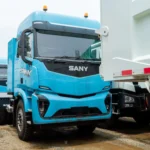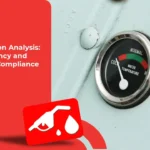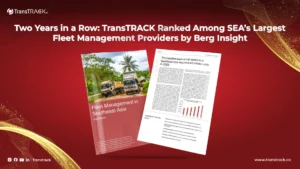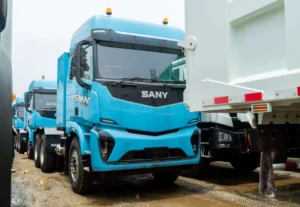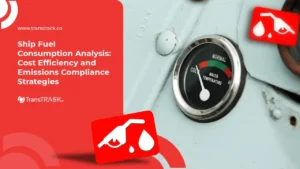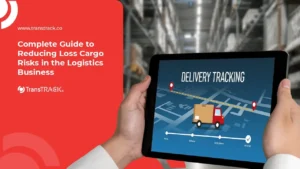Logistics Vehicles, How to Choose the Right One?
Posted on August 9, 2024 by Nur Wachda Mihmidati

In the increasingly complex and dynamic world of logistics, efficient delivery of goods is the key to success. Logistics vehicles, as the backbone of the supply chain, play a vital role in ensuring goods reach their destination on time and in good condition. With various types of vehicles and advanced technologies available today, companies can utilize various solutions to improve the productivity, safety, and sustainability of their operations. This TransTRACK article will explain the different types of logistics vehicles, the role of technology in improving vehicle performance, and how the latest innovations can affect your delivery efficiency.
What is a logistics vehicle
A logistics vehicle is a vehicle specifically designed or used to transport goods or cargo from one place to another in the supply chain. This can include various types of vehicles, such as trucks, vans, or containers transported by ship or train. Logistics vehicles are usually equipped with features that support efficiency in the distribution and delivery of goods, such as GPS tracking systems, temperature control (for temperature-sensitive goods), and other technologies that help ensure timely and safe delivery.
These vehicles play an important role in the logistics industry, especially in connecting producers, distributors, and consumers. For example, in the food & beverage industry, logistics vehicles play a role in ensuring that products reach their destination in a condition that complies with food safety standards.
How to Choose the Right Logistics Vehicle?
Choosing the right logistics vehicle is crucial to ensure optimal efficiency, safety, and operational costs. Here are some steps to follow:
Understand the type of cargo
Determine the type of goods to be transported. Is it durable goods, perishable goods, or goods with special requirements such as temperature regulation? The type of cargo will affect the type of vehicle you need.
Pay attention to the Transport Capacity
Make sure the vehicle has a capacity that matches the volume and weight of the goods to be transported. Too small will require you to make more trips, while too large can result in inefficient fuel costs.
Consider the Route and Road Conditions
If the delivery route involves narrow or winding roads, you may need a smaller, more agile vehicle. For long-distance deliveries on highways, large trucks may be more efficient.
Consider Fuel Consumption
Choose a fuel-efficient vehicle, especially if the vehicle will be used for long-distance travel or if you want to reduce operating costs.
Check Safety Features
Vehicles with good safety features, such as reliable brake systems, ADAS (Advanced Driver Assistance Systems), and tracking technology, can help reduce the risk of accidents and lost items.
Evaluate Supporting Technology
Choose vehicles equipped with technologies such as GPS for real-time tracking, E-seal for added security, and fleet management systems that can help you better manage your operations.
Pay Attention to Maintenance Costs
Vehicles that require low maintenance or have easy access to spare parts can save money in the long run.
Consider Brand Reliability and Reputation
Choose a vehicle from a manufacturer known for its reliability and good after-sales service support. This can minimize downtime due to breakdowns or other issues.
Flexibility and Future Adaptability
Consider whether the vehicle can be easily modified or adapted for future logistics needs, for example, the addition of new technologies or customization for different load types.
Look at Regulations and Compliance
Make sure the vehicle meets all local and international regulations related to the transportation of goods, such as emission regulations, safety, and load permits.
By considering these factors, you can choose the logistics vehicle that best suits your operational needs and budget.
Types of Logistics Vehicles
Here are more complete types of logistics vehicles with additions from various references:
Trucks and Trailers
- Small Trucks: Used for delivery of moderate amounts of goods or in tight urban areas.
- Heavy-Duty Truck: Suitable for long-distance delivery and transporting heavy loads.
- Box Trailer (Box Truck): A truck with an enclosed box that protects goods from weather and theft. Ideal for items that require extra security.
- Flatbed Trailer: A flatbed truck with no walls or roof, used for transporting bulky goods such as machinery or building materials.
- Refrigerated Trailer (Reefer Truck): A trailer with a refrigeration system for transporting perishable goods such as food and medicine.
- Tank Trailer (Tanker Truck): Used to transport liquids, gases, or chemicals.
Vans and Pickups
- Commercial Van (Cargo Van): An enclosed vehicle used for the delivery of small to medium-sized goods, suitable for inner city deliveries.
- Refrigerated Van: Similar to a cargo van, but equipped with a refrigeration unit to transport goods that require temperature control.
- Pickup Truck: A multipurpose vehicle with an open tailgate, suitable for transporting smaller items or for logistics needs that do not require the transportation of large quantities.
- Cargo Minibus: A smaller version of the van, ideal for delivering small quantities of goods in urban areas.
Specialty Vehicles
- Dangerous Goods Transport Vehicle: A truck specially designed to transport chemicals, toxic gases, or other hazardous materials with strict safety systems.
- Animal Transport Vehicle: A specialized vehicle designed to transport animals with appropriate ventilation and space for animal comfort and safety.
- Car Carrier : A large truck used to transport cars or other vehicles in bulk.
- Waste Transport Vehicle: A truck designed to transport solid or liquid waste with special security systems to prevent contamination.
- Heavy Haul Truck: A truck used to transport heavy loads such as heavy equipment, large machinery, or construction parts that cannot be transported by regular trucks.
Electric and Eco-friendly Vehicles
- Electric Trucks : Trucks that use electric batteries as an energy source, increasingly popular for inner-city deliveries as they are more environmentally friendly and reduce fuel costs.
- Hybrid Truck: Combines an internal combustion engine with an electric motor for better fuel efficiency.
Autonomous Logistics Vehicle
- Self-Driving Truck: An autonomous vehicle that can transport goods without a human driver. Although still in the development stage, this technology is starting to be applied in some areas to reduce operational costs and improve efficiency.
These types of logistics vehicles each have their advantages and are suitable for various delivery needs based on the type of goods, distance, and road conditions.
What is the Role of Technology in Logistics Vehicles?
Technology plays an important role in improving the efficiency, safety, and reliability of logistics vehicles. Here are some of the ways technology affects and supports logistics vehicle operations:
Fleet Management System
This technology enables real-time vehicle location tracking and route optimization for delivery efficiency. The system also helps in scheduling vehicle maintenance based on usage data. Good fleet management reduces operational costs and improves productivity.
Advanced Driver Assistance Systems (ADAS)
ADAS includes features such as traffic sign recognition and automatic emergency braking to improve driver safety. The system also includes lane departure warnings to prevent accidents. This technology helps drivers by reducing risk and improving compliance with traffic regulations.
E-seal Technology and Security
E-seal uses RFID to secure cargo with an electronic seal that can only be opened at the destination. The cargo monitoring system monitors the condition of the goods during transit, including temperature and humidity. This increases safety and ensures the goods arrive in the appropriate condition.
Autonomous Vehicles
Autonomous or semi-autonomous vehicles can reduce labor costs and improve delivery efficiency. This technology allows vehicles to operate for 24 hours without the limitation of drivers’ working hours. Although still evolving, this technology offers great potential to revolutionize the logistics industry.
Electric and Eco-friendly Vehicles
Electric vehicles reduce greenhouse gas emissions and fuel costs, suitable for in-city deliveries with emission restrictions. Hybrid vehicles combine an internal combustion engine with an electric motor for better fuel efficiency. This technology helps reduce the environmental impact of logistics operations.
Big Data and Analytics
Big data helps in predicting vehicle maintenance and analyzing operational efficiency based on sensor data. This enables better decision-making and prevention of breakdowns before they occur. Data analytics also helps in identifying areas that require improvement to enhance fleet performance.
Internet of Things (IoT)
IoT allows vehicles and central systems to communicate, providing data on the condition of the engine and cargo in real time. IoT sensors monitor cargo conditions during transit, such as temperature and vibration. This improves visibility and control over logistics operations.
Blockchain for Security and Transparency
Blockchain records all transactions and cargo movements, providing an immutable record for transparency. Smart contracts automate payments and approvals based on programmed conditions. This technology increases trust and efficiency in the logistics supply chain.
As technology evolves, logistics vehicles are now equipped with innovations that improve operational efficiency, safety, and sustainability. From advanced fleet management systems to autonomous and eco-friendly vehicle technologies, every aspect of modern technology contributes to better logistics management. To optimize your logistics vehicle operations, consider using TransTRACK’s Fleet Management System. With our system, you can monitor vehicles in real-time, manage maintenance schedules, and optimize routes more efficiently. Contact us today to find out more about how TransTRACK can improve your fleet performance and take your logistics operations to the next level.
Recent Post
Topic :
 Bahasa Indonesia
Bahasa Indonesia




